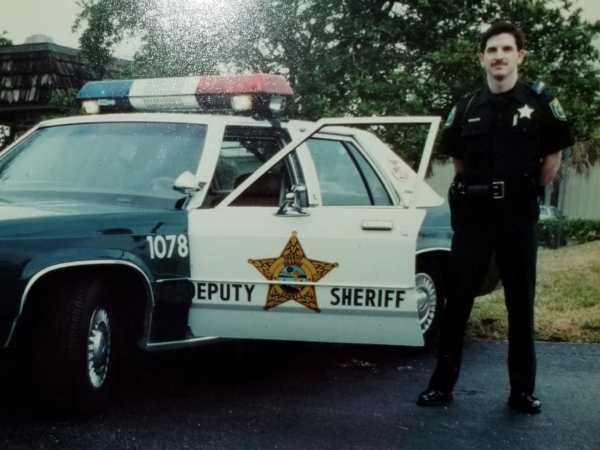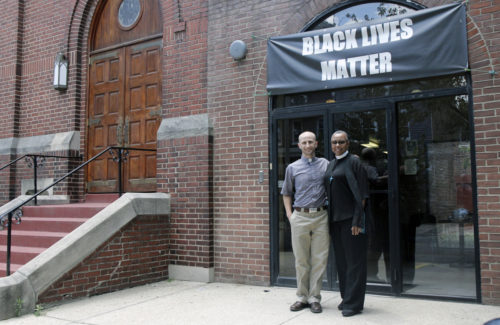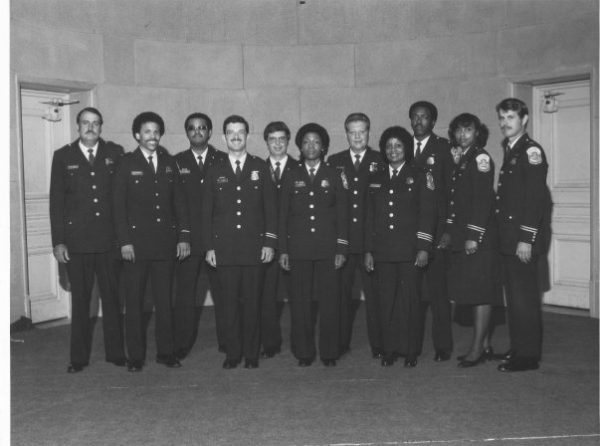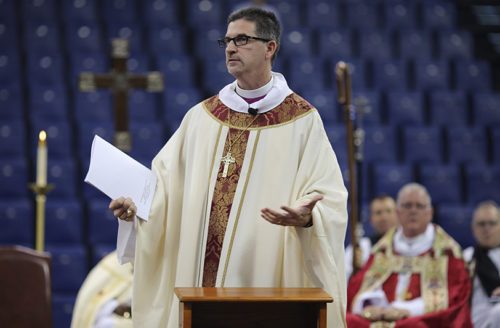A bishop and priest with previous law enforcement careers confront a system in crisisPosted Aug 12, 2020 |
|

Bishop José McLoughlin of Western North Carolina as a deputy sheriff in Orange County, Florida, around 1991. Courtesy photo
[Episcopal News Service] When Bishop José McLoughlin of Western North Carolina was young, he had his heart set on a career in law enforcement. Informed by his Roman Catholic upbringing, he wanted to pursue organized crime as a prosecutor, maybe get involved in politics, and “change the world” by working for justice.
“I was really drawn to law enforcement, and then ultimately the priesthood, because of humanity – because of the wonderful, joyful, frustrating, annoying mess that is humanity,” McLoughlin told Episcopal News Service.
A college professor who had previously served as a sheriff encouraged McLoughlin first to “put a face on the people that you would serve” by becoming a police officer, and after a ride-along, he was “hooked.” At the age of 21, he began a 13-year career in law enforcement, first as a deputy sheriff in Orange County, Florida, near where he grew up in the Orlando area, and then in various capacities at the U.S. Department of Justice, striving to bring compassion into difficult situations and make policing more just.
Now 51 and a bishop, McLoughlin gets emotional when he talks about the police killing of George Floyd in Minneapolis, Minnesota, and about the ambush killings of two police officers responding to a report of a fight at a home in McAllen, Texas, in July.
“Man, I couldn’t be an officer right now,” McLoughlin said.

The Rev. Gayle Fisher-Stewart during her days in the Metropolitan Police Department of the District of Columbia, pictured with Assistant Chief Tilmon B. O’Bryant. Courtesy photo
He and the Rev. Gayle Fisher-Stewart, a former captain in Washington, D.C.’s Metropolitan Police Department, spoke to ENS about their perspectives on policing and race as clergy who previously worked in law enforcement. Fisher-Stewart, who is Black, and McLoughlin, who is Latino, have both participated in “Reimagining Policing in America,” a webinar series from the Absalom Jones Center for Racial Healing that features panel discussions on the systemic problems in American law enforcement and possible solutions.

The Rev. Gayle Fisher-Stewart, right, and the Rev. Peter Jarrett-Schell, rector of Calvary Episcopal Church in Washington, D.C., pose for photo under a Black Lives Matter banner in 2016. Photo: Lynette Wilson/Episcopal News Service
Fisher-Stewart has also presented the “To Serve and Protect” webinar for the Union of Black Episcopalians, focusing on the racist origins of American policing and its evolution over time. Fisher-Stewart is the interim rector of St. Luke’s Episcopal Church in Washington, where she grew up. A previous church she served, Calvary in Washington, was one of the first Episcopal churches to embrace the Black Lives Matter movement. She has edited “Preaching Black Lives (Matter),” a theological anthology, and has taught criminal justice at the University of Maryland. She also serves as a chaplain to the Takoma Park, Maryland, Police Department and has given similar presentations to police officers.
She starts the webinar by presenting “four guiding principles” that provide the basis for what she is about to say and asks all attendees to “assent” to them – agreeing to at least consider them, even if they do not agree with them:
– The United States is a racist country.
– Racism is baked into the DNA of the United States.
– American policing is the enforcement arm of a racist society.
– Police officers are also victims of a racist society.
“What happens when we say this – people get a little uptight. They get a little offended,” she told the attendees, but stressed that she was referring to institutional racism and not accusing individuals of being racist. “As part of this process, we have to be able to talk about policing and its function without it pointing to us as individuals, because if it points to us as individuals, then we’re not able to hear what we need to hear.”
Although officers may still balk at such statements, Fisher-Stewart, who retired from the force after 20 years in 1992, has the clout to back them up.
“Because of [my] experience, I have more credibility with the officers than a civilian would,” she told ENS.
“I walk a thin line between being a member of the community, a former police officer and the mother of a Black son and aunt to Black nephews and nieces and a critic of American policing.”
When she entered the force at age 20 in 1972, she was well aware that the department had a racist reputation, but the job would help her pay for school. Most officers, she said, sign up with good intentions but many “become infected with the racist underpinnings of policing” and get hooked on power.
“Initially, it’s like an aphrodisiac, having that power, knowing that people will do what you tell them to do, for whatever reason,” she told ENS. “But after a while, you become aware of some things that you really don’t like.”
She was bothered by the number of people being arrested – giving them a record that could change the trajectory of their lives – for things that could be resolved in other ways. And there was the outright racism.
“It was in your face and nobody cared,” she said, giving an example from when she was a rookie and her white training partner said something with a straight face that disturbed her.

The Rev. Gayle Fisher-Stewart, second from right, being promoted to a lieutenant in the Metropolitan Police Department of the District of Columbia. Courtesy photo
“This was a time when you could just stop cars because you were bored,” she said. “He was driving the first four hours and he’s stopping cars. And I’m not paying any attention because you just stop a car because you want something to do. But when it got to be my turn to drive, I went to stop this car. He said, ‘Why are you stopping the car?’ I said, ‘Uh, because that’s what we do.’ And he said, ‘We don’t stop white people.’ And I was like, ‘Do you see who’s sitting here?’”
McLoughlin said that in recent weeks, he has looked back over his time as an officer, replaying memories in light of the current debates over policing in America, but doesn’t remember ever witnessing “what I would call an outright abuse of power.” He was always bothered, though, by officers disparaging and cursing at suspects.
“That always used to just drive me nuts,” he said.
He agrees with Fisher-Stewart that “the vast majority of people who go into law enforcement do it because they feel they have a sense they want to serve.” At the same time, he said, “it’s important to say there are bad cops. There is no doubt about it. There are bad priests. There are bad teachers.”
And like Fisher-Stewart, he is deeply aware of systemic racism in policing.

The Rt. Rev. José A. McLoughlin addresses the congregation during his ordination and consecration as bishop of the Diocese of Western North Carolina. Photo: Chris Goldman/Diocese of Western North Carolina
“The history of policing is such that, if you look at it, I mean, it was to control Black people,” McLoughlin said. “I mean, let’s just be honest. When you really look at policing in its earliest forms and how it developed, it has that systemic racism running in it. Are all cops bad? No. Are all agencies racist? No. But it is the concept and the approach and the underlying things that got us there. Is it historically racist? Absolutely.”
When he watched the video of George Floyd being killed, he was “beyond nauseated.”
“I was so emotionally angry,” he told ENS. “Not only did it make me sick to see a human being get murdered by a police officer, but it made me so angry to see somebody in a uniform that I used to take such pride in do so much damage to the integrity of so many men and women who risk their lives.”
McLoughlin has been disturbed by the polarization and demonization surrounding debates about policing in America and says “you don’t have to choose one side.”
“We have to recognize murder is murder. Racism is racism. There is systemic racism. Black people are significantly more at risk of getting killed and having violent interactions [with police],” he told ENS. “But we don’t have to sacrifice good people who really are working hard to protect the community and really are absolutely sickened by what they’ve seen. We’ve got to find the balance, and the church has to be the one to bring voices into a room to say, ‘Stop the name-calling, stop the generalization and let’s really work hard on how we’re going to bring solutions.’”
McLoughlin and Fisher-Stewart agree that today’s police are being asked to do too much, but they differ on the effectiveness of reforms and retraining. McLoughlin “support[s] the idea of pulling a lot of functions away from law enforcement” and believes training can be refined and enhanced to redirect police forces toward solving problems in their communities.
“We don’t have to sacrifice good strategies and good solutions to figure out how we help law enforcement,” he said.
Fisher-Stewart has less faith in reforms and would like to see actions more in line with Camden, New Jersey’s total overhaul of its police force, which was eliminated and rebuilt from scratch.
“Overall, I’m for abolishing the police as they were created and continue to act,” she told ENS. “Does that mean I want no police? No, it doesn’t.”
Like McLoughlin, Fisher-Stewart sees a common thread running through her desire to improve law enforcement and her vocations as a priest.
“I draw my source from the Gospel of John, 18th chapter, where Jesus has been arrested and he’s brought before the high priest and the high priest is questioning him,” Fisher-Stewart said. “This is the equivalent of his arraignment. And when he does not act, when he does not respond in a way that people think he should, he is actually hit in the face by the temple police. That is the first recorded act of police abuse. And it’s on the body of Christ. And so if we don’t stand up because the people of God are treated negatively, then we’re saying it was OK to treat Jesus like that.”
– Egan Millard is an assistant editor and reporter for Episcopal News Service. He can be reached at emillard@episcopalchurch.org.

Social Menu